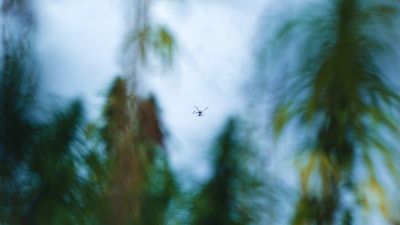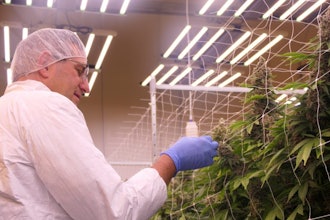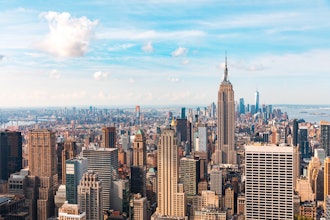
Cannabis is a huge cash crop in some parts of the U.S. and the world. As social and political pressure continue to make this plant and its derivatives more widely available for manifold uses, investors and supply chain companies are beginning to ask: How can I stake a claim in this fast-growing, soon-to-be $60-billion industry while keeping my people and assets safe?
The cannabis supply chain contains many separate steps, participants and locations. In some ways, it presents challenges that are typical of any supply chain operation. But in other ways, including security, seeing cannabis products from fields to retail locations is a unique endeavor. Let's dive in.
Fields & Greenhouses
Cannabis plants are always valuable, but some strains are even more "highly" prized for their unique blends of THC and CBD, plus their taste, intensity and desirable effects. Consequently, any business that operates cannabis fields or handles cannabis plants needs to take video surveillance seriously. A single camera can cover a significant amount of real estate or even a 360-degree view, and cloud backup of your footage ensures immediate playback or later retrieval.
There's a trend among cannabis growers to use aerial drones as well to keep an eye on the building and grounds as well as the surrounding area. In fact, technology-wielding third-party security companies represent one of the fastest-growing "ancillary" business categories in marijuana-friendly territories.
The companies best positioned for growth in third-party cannabis logistics are those that make use of technology to ensure a consistently high quality of service.
In Chesaning, Michigan, Lelantos Transport came out of the gate early with a regional industry-leading track-and-trace technology platform to ensure that harvested plant materials from fields and greenhouses get to processing plants for the next steps consistently, safely and securely.
In the state of Colorado, growers must remain aware of specific security and safety requirements, like keeping the entire grow area under surveillance at all times and insisting on eight-foot gates around the perimeter.
Processing Plants
In May 2019, MichiCann Medical signed a letter of intent to take control of what will be the largest indoor hemp processing facility. Hemp isn't psychoactive, but it's a close cousin and valuable in its own right. This facility's 451,000-square-foot processing and warehousing center (and 231 acres of land) demonstrate the sheer amount of real estate that will require security-mindedness as this industry takes off.
Cybersecurity is another factor you can't overlook when it comes to processing plants. The threat surface for digital activities at any business is significant already, even before you introduce a controversial substance. If your grow operation uses automated lighting, HVAC or other digital-physical systems, there's a chance you could be at risk. In California, manufacturers and other corporate identities will need to prove the security credentials of their connected devices by January 2020.
It's all too easy to neglect the basics in an age where cyber threats are a constant worry. Every processing plant requires bollards (heavy posts, usually made of steel, that keep vehicle traffic out of restricted areas) as well as staffed security gates. Perimeter security is critical if you want to keep vehicles, random passersby or both from misidentifying your property as a good place to linger or stage a crime.
Retail Locations
Retail locations had a slight advantage in previous years when dispensary customers had to produce a "cannabis card" for admittance into retail locations. But now, as legalization takes off and more casual users find their way into cannabis shops and dispensaries, that convenient security buffer is effectively gone.
So what are the best ways to protect the point of sale? To put it another way, how much security does your dispensary actually need? Here are the essentials:
- Keep security systems and guards at the entrance and exit.
- Rely on video surveillance with instant playback for a quick response to security incidents.
- Look at your options for third-party armored transportation services to get cash and products to and from your retail location. Dealing with significant amounts of cash is going to be a fairly standard part of the cannabis retail experience for the foreseeable future.
It's important that you work with your onsite security officers so that they can provide the ideal amount of protection without making first-time customers more nervous than they already might be.
Cybersecurity applies to your retail locations too. Your processing plants can be one tempting target for cybercriminals, but your point of sale system, inventory management and customer management software are all potential weak points as well. Carefully vet your software vendors and technology partners before signing a contract or beginning a subscription.
Packaging requirements are strict and detailed in many legal cannabis states, but even tamper-proof packaging isn't always "fool"proof too. Know your products well, including those that tend to "grow legs," according to your loss prevention officer, and make sure they're positioned thoughtfully and strategically within the store in order to minimize shrinkage.
Speaking of loss prevention officers: You do have one, right? In a business like this one, they're a must.
It's unfortunate, but a shocking 90% of theft at marijuana dispensaries and cannabis stores is an inside job. As a final note on securing your physical retail location, remember to vet all of your potential employees carefully.
Security Is Key, No Matter the Venue
Each of these "venues" requires early and consistent attention to security in order to protect the product and keep workers safe. None of this effort is worth it if customers aren't receiving products that meet their expectations or medical needs or if your own employees can't count on their safety.
The cannabis supply chain is coming together right in front of our eyes, which means we can expect other questions and growing pains along the way. But if you keep security top of mind from the start, even new changes to regulations and expectations shouldn't catch you, or your operation, flat-footed.






















